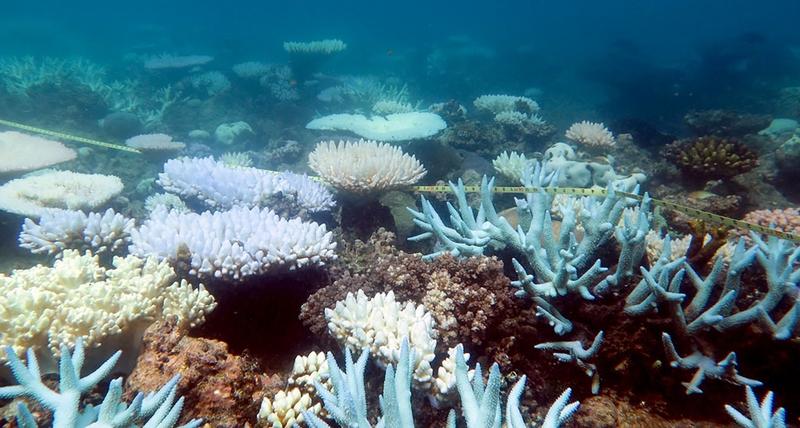 An undated handout photo received from ARC Centre of Excellence for Coral Reef Studies on April 19, 2018 shows a mass bleaching event of coral on Australia's Great Barrier Reef. (MIA HOOGENBOOM / ARC CENTRE OF EXCELLENCE FOR CORAL REEF STUDIES / AFP)
An undated handout photo received from ARC Centre of Excellence for Coral Reef Studies on April 19, 2018 shows a mass bleaching event of coral on Australia's Great Barrier Reef. (MIA HOOGENBOOM / ARC CENTRE OF EXCELLENCE FOR CORAL REEF STUDIES / AFP)
Possible moves to list Australia’s Great Barrier Reef on the “in danger” list by the United Nations Educational, Scientific and Cultural Organization’s (UNESCO) may help rescue the rare wonder, according to experts in Australia.
Professor Peter Harrison, director of the Marine Ecology Research Centre at Southern Cross University, Queensland, said the Reef had experienced three mass bleaching events in 2020, 2017, 2016 plus two more in 2002 and 1998
UNESCO’s World Heritage Committee will meet in Fuzhou for its 44th session from July 16-31 where the future of the Reef will be discussed. Leaked information in Australia indicates related experts are considering to recommend the listing despite Australia’s protective measures.
Professor Peter Harrison, director of the Marine Ecology Research Centre at Southern Cross University, Queensland said UNESCO’S proposed “in danger” listing for the Great Barrier Reef is a “fair assessment”, given the extreme threats to the Reef.
“It faces a perfect storm of potentially severe impacts that continue to erode its resilience,” he said.
Harrison said the Reef had experienced three mass bleaching events in 2020, 2017, 2016 plus two more in 2002 and 1998.
ALSO READ: UN committee: Great Barrier Reef should be listed as 'in danger'
“The science behind the modelling shows the threat to the GBR is real and has been intensifying since the 1980s as global temperatures increased.
“Other threats include water quality issues leading to chronic outbreaks of crown-of-thorns starfish and increased intensity and severity of cyclones also associated with climate change,” he said.
Harrison, who has worked on the Great Barrier Reef for more than 40 years said: “I have seen the health of the Reef diminish”.
“Greenhouse gas emissions are leading to a warming of the planet which increases ocean temperatures. This causes more extensive, longer and more frequent coral bleaching events which kill corals at a faster rate than they can naturally recover.
“Each year, the risks of another marine heatwave and mass coral bleaching are increasing as the baseline sea temperature increases.
“We need urgent action to reduce greenhouse gas emissions and a global consensus on how to more effectively implement international agreements to reduce emissions."
Associate Professor Scott Heron from the Australian Research Centre’s Coral Reef Studies at James Cook University in Queensland said the news was “in some ways a surprise but not completely unexpected.”
“These cards have been stacking up over the years,” he said.
He cited the “Great Barrier Reef Marine Park Authority 2019 Outlook” in which it said the future of the reef looked “very poor”, as an example.
He also said the International Union for Conservation has described the reef’s health as “critical” citing repeated broad-scale coral bleaching, cyclone damage and issues around water quality.
Heron said it is “important to note that this is a draft decision, which will be discussed next month at the World Heritage Committee meeting”.
“It certainly shows that the world is watching – in terms of both main threats of climate change and water quality,” he added.
Associate Professor William Figueira of Marine Animal Biology at the University of Sydney said the decision is “unfortunate but probably not surprising”.
READ MORE: Study: Baby coral deaths threaten Great Barrier Reef’s recovery
He said the Great Barrier Reef has been hit by three consecutive bleaching events in the last five years and there are now only a few places on the reef that have avoided impact.
“While there are a host of programs aimed at addressing problems, some as part of the Reef 2050 plan and, more recently, the work being done as part of the Reef Restoration and Adaptation Program, the most important issue is also the most challenging to tackle…ocean warming driven by climate change,” he said.
“Bleaching events are becoming more frequent and thus there is little time for recovery.”
He said: “It would seem it's our lack of coherent leadership in this space, combined with our position as a major global supplier of fossil fuel products, that raises concern about how committed Australia is to tackling the major issue affecting this very special place, the Great Barrier Reef."


